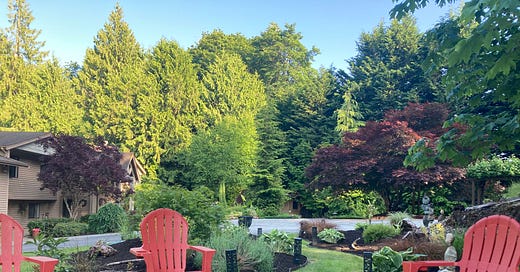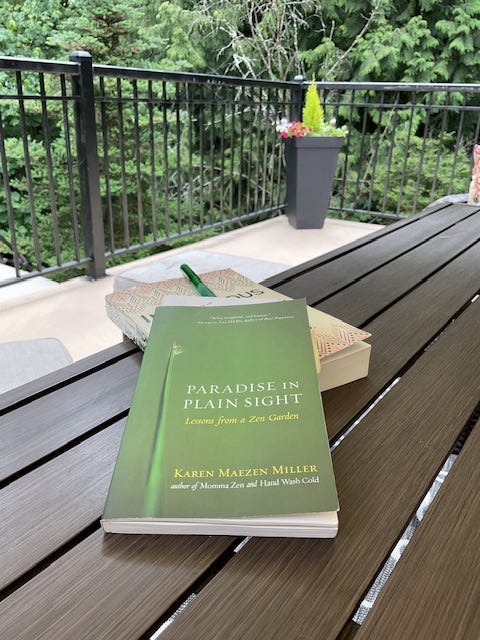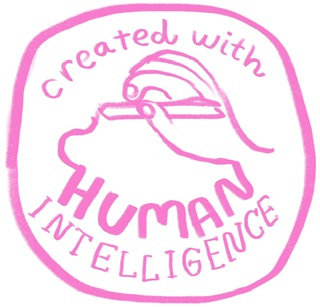It’s my daily practice to read some form of wisdom, be it from philosophy, poetry, or spirituality of one kind or another. I tend to have at least three books going at a time: a book of poetry (currently meandering through Charles Bukowski’s The Pleasures of the Damned); a main book of focus, which tends to be a nonfiction work but with periodic novels thrown in for balance and perspective (currently reading, loving, and almost finished with Richard Katz’s Indigenous Healing Psychology: Honoring the Wisdom of the First Peoples); and a devotional work of some form (just started, again,—maybe on my fourth reading—Karen Maezen Miller’s Paradise in Plain Sight: Lessons from a Zen Garden).
And for about the fifth year in a row, a part of my morning devotional practice includes a yearlong, more intensive study of some aspect of soul life. Typically, this includes daily readings of The Tao Te Ching. Last year, I focused on A Course in Miracles. I’ve also studied Micheal Singer’s Untethered Soul in this manner.
This year, using William Martin’s interpretation of the Tao as a daily guide (The Daily Tao), I’m using as companion pieces Stephen Mitchell’s Tao Te Ching: A New English Version and Wayne Dyer’s Change Your Thoughts, Change Your Mind.
And then I journal quotes, passages, and my reflections.
Does Paradise Exist?
First, we must come to an understanding of what the true meaning of “Paradise” is.
The word "paradise" originates from the Persian word "pairidaeza," meaning "enclosed park" or "walled garden." This term was then adopted by the Greeks as "paradeisos," which was used to refer to the Garden of Eden in the Septuagint (the Greek translation of the Jewish scriptures).
So, far from its current usage of some form of a beautiful, idyllic, and/or pristine environment, paradise is simply, and humbly, an enclosed space. Period.
I’m thinking of this because of one of the books I’m using right now, well, reusing:
Paradise in Plain Sight is a beautiful book—Karen Maezen Miller is, among other roles, a Zen priest in the Taizan Maezumi Roshi lineage. In this relatively short, yet deceptively DEEP work, Miller weaves the experiences of discovering her physical home (on a property in SoCal that is a true Zen garden), with her true home (her place of Being). I’m sitting down to write this post after having read her chapter three: PATH. Paths, in Zen, in all of Eastern mysticism and spirituality, are important. The Tao, even though it can’t be named, can be named “The Way.” The “Way” is a kind of path. Life is a kind of path. There are paths in Paradise.
“You stumble along thinking you don’t know the way, and then one day you realize you’re in the middle of it.”
~ Karen Maezen Miller (p. 17)
This is kinda what I’m fully realizing now in this last third of my life—that while I thought I was on a search for deep meaning, connection, resonance, spirit, soul, and Being, I have always been in the middle of it. As a child growing up on a farm, a high school football player, a college grad, a teacher and principal, a husband, a father, and now a grandfather, establishing the through-lines through it all and forging a path ahead, when I naively thought I was any of those over the course of the preceding two-thirds of my life, I was actually in the middle of it all, all the time. There was no path to forge. I wasn’t working to get somewhere, to create my ideal paradise. I’m finally grasping one of the essential tenets of Zen: just let go and get rid of all the non-essentials, and when you are rid of the non-essentials, you’ll come to realize all you have left is…
…just this.
And “just this” is always enough. It’s all there is anyway. And because this is the case, it’s always been my paradise, hidden from me, until recently, in plain sight! (Hey, what a great title for a book, eh?).
A full realization of this, which, as I’m discovering, takes a lifetime of practice, is tremendously comforting. Comforting, because I’m never lost. I’m never not where I’m supposed to be. I’m always in the enclosed space of my life, which includes everything. I’m always in my paradise…
… because I’m always right here.
“There is such a thing as home, and the relief you find there is complete. All you have to do—for one flickering instant—is notice.”
~ Karen Maezen Miller (p. 19)
Miller goes on to say (which is to say she goes on to teach):
“It’s always thought that a path was a means to an end. A course of study, a tour of duty. The distance from A to B. […] But … we never arrive. The path isn’t the way to get something; the path is the way to live.
“It’s a path we never leave but rarely see. We don’t notice where we’re standing. We don’t notice where we’re walking. We don’t notice the sights, smells, or sounds around us. We don’t notice our traveling companions or the people we pass by. When we are absentminded, the world is a wilderness.
“But all the while, we are on the way. […] I knew that all my late starts, wrong turns, and missed signals were part of my path. Every lapse in judgment, miscalculation, and hesitation had been perfectly timed. Everyone I’d ever known, everything that had ever happened, had landed me here. Nothing I’d ever done had been a mistake. Not even the mistakes had been mistakes.” (p. 19)
This Teaching is Universal in that just about every spiritual tradition and religion has this as one of its major tenets. “God is always within you.” “Where two or more of you have gathered, there I shall be as well.” “Heaven is right here.” “Be Here Now.” “Just Breathe.” “Paradise is in plain sight.”
“What do you practice?”
…asks Miller on page 20. It’s good to think on this. “The unexamined life is not worth living,” so says Socrates. I want my life to be worth living, so I examine it. And I ask myself often: “What am I practicing? Why? How? And am I getting better at it?” Miller shares “Whatever you practice, you get good at. Some people become more fearful or cynical; some more arrogant or vain; some greedier; some needier; some more combative or close-minded. That’s what they practice.” (p. 20-21)
YUCK! But true, right? I mean, just look around! A LOT of people are getting a LOT of practice on things that are not healthy—for them or for the rest of us. And a LOT of people are getting too good at it.
Look, I know I’m reading a great book for me, that I’m being taught by a great teacher, when I read in its pages what I’m aspiring to live up to:
“And then there are a few who grow as solid as a mountain and as wide-open as the sky. They are strong and yet tender. Steady yet yielding. Powerful yet gentle. You will recognize them because they resemble the earth you can touch and the sky you cannot contain. It’s not that they are superhuman; they are more completely human than most of us ever allow ourselves to be.” (p. 21)
I want to practice that—to allow myself to become that. Let that be my enclosed life. Let that be my paradise.
This started out as a Post about a place—a place called Paradise. It evolved to become a Post about paths. And then in the middle of it all, in the middle of my life, I discovered the two are not different—they are the same thing.
In a deep way, the path I’m on is one I never had to find. It was always right here, in the place that I am. In a deeper way, this has always been my paradise. My life is my path and my paradise. My life is the enclosed space of my life. And yet, even this begs one of the most important questions of all because it calls out an illusion:
Does an Enclosed Space even exist?
Nope.
Think deeply about that.
Life includes everything; and if it includes everything, how can anything be enclosed? It’s quantum physics.
So ask yourself, as I’m asking myself:
Does Paradise, therefore, exist?
Yep.
We’re living it. It’s in plain sight! As Karen Maezen Miller rightfully shares: “Everything’s a metaphor, and nothing is a metaphor.” It’s also what Zen koans are all about: True Meanings—words are not worthy or adequate for definitions. It’s quantum physics.
Paradise is an enclosed space. Enclosed spaces don’t exist, ergo Paradises don’t exist. I’ve always lived in the middle of my Paradise which existed hidden from me in plain sight, ergo Paradises exist. Paradises are enclosed spaces.
(I tried to put my words to it, but no words of mine are worthy, and none are certainly adequate. I’ll just stop pointing my finger to it, and simply gaze.)
May that our lives become …
… just this.
Always and Ubuntu, and thanks for being a part of my paradise (you had no choice anyway),
~ k
🙏🏼 💙🙏🏼









Thank you, Kert. This entire post resonated. I appreciate your recommendations and the you tube as well.
The path only exists where we are in this moment. I’m practicing awareness of that, at least when I remember to…